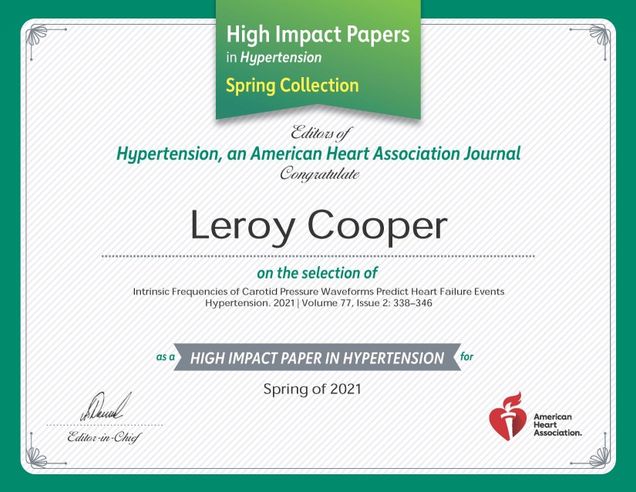FHS Paper Selected as Hypertension High Impact Paper for Spring 2021
FHS Paper Selected as Hypertension High Impact Paper for Spring 2021
The recently published article, “Intrinsic Frequencies of Carotid Pressure Waveforms Predict Heart Failure Events” from FHS researchers was selected as a High Impact Paper for Spring 2021 in the category of population science.
High Impact papers are selected every quarter by the editors of Hypertension, an American Heart Association scientific journal, to draw attention to the most important research published in the journal during the preceding 3 months.
Abstract
Intrinsic frequencies (IFs) derived from arterial waveforms are associated with cardiovascular performance, aging, and prevalent cardiovascular disease (CVD). However, prognostic value of these novel measures is unknown. We hypothesized that IFs are associated with incident CVD risk. Our sample was drawn from the Framingham Heart Study Original, Offspring, and Third Generation Cohorts and included participants free of CVD at baseline (N=4700; mean age 52 years, 55% women). We extracted 2 dominant frequencies directly from a series of carotid pressure waves: the IF of the coupled heart and vascular system during systole (ω1) and the IF of the decoupled vasculature during diastole (ω2). Total frequency variation (Δω) was defined as the difference between ω1 and ω2. We used Cox proportional hazards regression models to relate IFs to incident CVD events during a mean follow-up of 10.6 years. In multivariable models adjusted for CVD risk factors, higher ω1 (hazard ratio [HR], 1.14 [95% CI], 1.03–1.26]; P=0.01) and Δω (HR, 1.16 [95% CI, 1.03–1.30]; P=0.02) but lower ω2 (HR, 0.87 [95% CI, 0.77–0.99]; P=0.03) were associated with higher risk for incident composite CVD events. In similarly adjusted models, higher ω1 (HR, 1.23 [95% CI, 1.07–1.42]; P=0.004) and Δω (HR, 1.26 [95% CI, 1.05–1.50]; P=0.01) but lower ω2 (HR, 0.81 [95% CI, 0.66–0.99]; P=0.04) were associated with higher risk for incident heart failure. IFs were not significantly associated with incident myocardial infarction or stroke. Novel IFs may represent valuable markers of heart failure risk in the community.
What Is New?
We have shown for the first time the prognostic relations between novel intrinsic frequencies derived from aortic waveforms and incident cardiovascular disease outcomes in the community.
What Is Relevant?
Blood pressure is a well-known risk factor for cardiovascular disease; however, recent interest has shifted to potential information contained within pressure waveforms.
Assessment of intrinsic frequencies is noninvasive and requires only the analysis of a single waveform; therefore, translation to the clinic is feasible.
Since these intrinsic frequencies are only modestly correlated with standard risk factors, they are suitable as potential biomarkers.
Summary
Intrinsic frequencies are novel cardiovascular health indicators that are associated with increased risk for heart failure in the community.
Read article full text online: Cooper, L. L., Rong, J., Pahlevan, N. M., Rinderknecht, D. G., Benjamin, E. J., Hamburg, N. M., … & Mitchell, G. F. Intrinsic Frequencies of Carotid Pressure Waveforms Predict Heart Failure Events: The Framingham Heart Study. Hypertension, HYPERTENSIONAHA-120.
